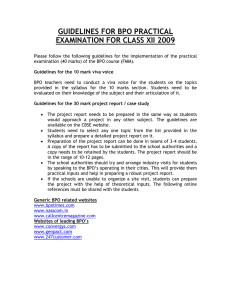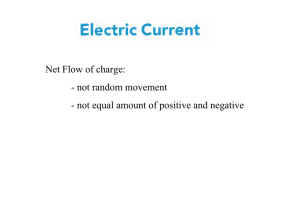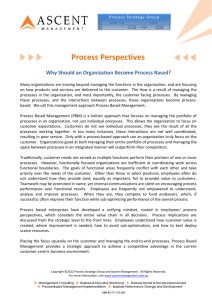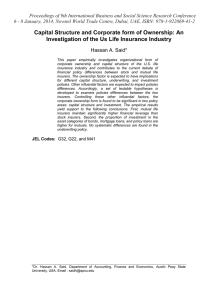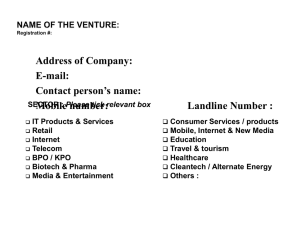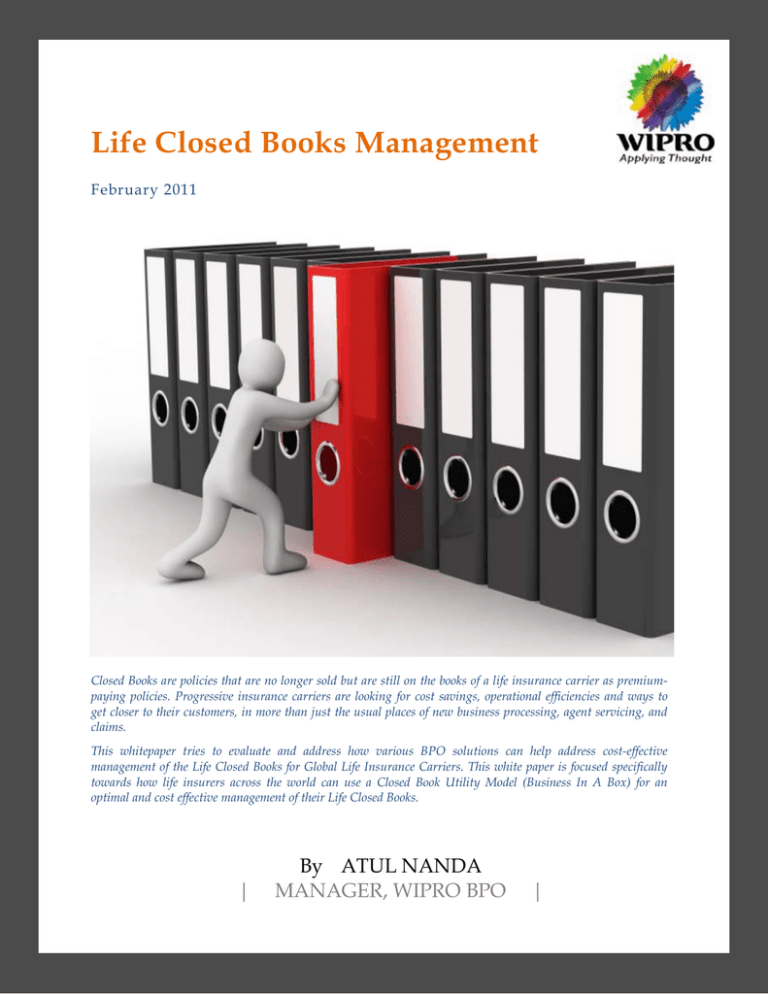
Life Closed Books Management
February 2011
Closed Books are policies that are no longer sold but are still on the books of a life insurance carrier as premiumpaying policies. Progressive insurance carriers are looking for cost savings, operational efficiencies and ways to
get closer to their customers, in more than just the usual places of new business processing, agent servicing, and
claims.
This whitepaper tries to evaluate and address how various BPO solutions can help address cost-effective
management of the Life Closed Books for Global Life Insurance Carriers. This white paper is focused specifically
towards how life insurers across the world can use a Closed Book Utility Model (Business In A Box) for an
optimal and cost effective management of their Life Closed Books.
|
By DATUL NANDA
MANAGER, WIPRO BPO
|
Life Closed Books Management
Contents
Introduction ................................................................................................3
Problems Faced ...........................................................................................3
Closed Books: Major Global Trends and Business Drivers ..............3
Challenges in Closed Books Management ...........................................5
The Solution................................................................................................5
Closed Books Utility Model BIAB (Business in a Box) ......................6
Benefits of the Closed Books Utility Model .........................................6
Conclusion ...................................................................................................7
Appendix .....................................................................................................8
References ...........................................................................................................8
About the Author ..............................................................................................8
2
Life Closed Books Management
Introduction
The global insurance industry faces a challenging and unprecedented market environment; insurance
premiums are falling and insurance carriers’ profitability is much below the pre-recession era. Added
to this, insurers in the US and Europe as well as elsewhere in the world are reeling under increased
regulatory and compliance costs in the next few years. Life Insurance Carriers worldwide are facing
huge challenges in all operational areas with pressures due to new/ revised legislation, tighter scrutiny
and compliance controls. The advent of the internet and the empowerment that it has given to the
customers does not help profitability either. Life carriers are fighting not just for profitability but for
survival itself.
Closed Books are policies that are no longer sold but are still on the books of a life insurance carrier as
premium-paying policies. The hardware and application maintenance costs for the systems that run
the life closed books are high. This is because they are often run on legacy systems that have been
starved of new investments. Moreover these systems are not strategic to the direction of the carrier
moving forward. Life closed books after all are caused by either discontinuing unprofitable products or
as a result of acquisitions and mergers.
The progressive carriers are looking for cost savings, operational efficiencies and ways to get closer to
their customers, in more than just the usual places of new business processing, agent servicing, and
claims. This whitepaper tries to evaluate and address how various BPO solutions can help address
cost-effective management of the Life Closed Books for Global Life Insurance Carriers.
Problems Faced
Life Insurance Carriers break-even on a typical new product only when a customer retains the product
and pays the premium for seven years. The cost of managing closed books of business after these seven
years is low relative to the effort involved in processing new business.
Acquisition of new business is expensive and thus the attention of most insurance carriers is drawn
towards the low hanging fruit of reducing non-commission, new business acquisition unit costs. This
creates a sense of complacency in attacking a potentially ripe area for cost reduction namely managing
the closed books in a smarter way.
Closed Books: Major Global Trends and Business
Drivers
Some global trends and business drivers that have led to the emergence of insurance closed books as
an addressable phenomenon in specific geographies are listed below:
Decreased Investment Returns and Less Profitable Products
In the early part of 21st century, global investment returns decreased substantially, affecting not only
insurers but other financial services companies as well. Insurers were forced to discontinue many risky
investment linked products and redesign a substantial part of their product portfolio. Also many
products were discontinued if they were not sufficiently profitable and were associated with high loss
ratios.
3
Life Closed Books Management
Earlier Strategic Geographic Spread Proved Unprofitable
Many large insurance firms, especially US & UK based firms had expanded into various countries
through their international arms in geographies like Middle East, Japan, Ireland, Hong-Kong, Africa,
etc., with predominantly investment and market linked products. These have largely turned into
highly loss making entities because of their portfolio turning unprofitable due to negative market
conditions globally.
Increasing Regulatory Scrutiny
Increased regulatory scrutiny, especially in the UK and the US by regulatory authorities opened a
debate into how such portfolios were managed and administered. Various new regulations have been
introduced limiting exposure levels to investment markets, stringent solvency standards, higher
transparency levels, reporting requirements and many others. These have led to increased costs of
maintaining compliance.
Complexity of Closed Books Management
Managing Closed Books portfolios is complex as such products are multi-channel, multi-lines of
businesses, multi-products as well as multi-funds.
Changes in Business Strategy
Some of the major insurers are focusing on more profitable Open Books as a business strategy. They
pass on their closed books to other players or specialized consolidators.
Market Innovations
New market operators have emerged, especially in the UK market like Closed Funds consolidators like
‘Pearl’, ‘Resolution’, ‘Admin Re’, etc.
Higher Mergers & Acquisitions Activity
Increased merger and acquisition (M&A) activity in the insurance space offers scope for a immense
rationalization and business restructuring.
Pressure To Reduce Operating Costs
The above factors combined with pressure to reduce policy administration and operational costs in
general, have added to the woes of insurers.
4
Life Closed Books Management
Challenges in Closed Books Management
Life insurance closed books have no new policy sales except for allowed increases in the policy.
Subsequent renewal premiums are received as per the contract. As no new policies are sold, the
portfolio size steadily decreases over time. Steadily decreasing portfolio size demands parallel
reduction in policy administration costs to keep the business profitable. As there are no commission
expenses for a closed book, on-going expense management is critical. Insurance closed books are also
regarded as weak and a drain on the company's capital.
Customer dissatisfaction and regulatory penalties arise from negative publicity, staff & agent attrition
as well as lack of transparency in terms of working.
Additionally, many of the closed funds are maintained on old Legacy Policy Administration Systems
which have very high maintenance costs. The hardware and application maintenance costs for the
systems are high because they are often run on legacy systems that have been starved of new
investments. Moreover these systems are not strategic to the direction of the carrier moving forward.
The Solution
Managing insurance closed books requires a management focus and needs to be separate from the
open business due to their special challenges. Insurers have adopted different courses of action,
depending on the size of their closed books and any other unique circumstances.
Options
Offloading closed books to any other
carriers or specialist consolidators of
closed books
Notes
Feasible option but chances of this option being a poor
cultural fit and would risk damaging the overall brand.
Additionally, there are no proven success stories in terms
of Specialists Consolidators achieving the scale benefits
and managing to move all the policies onto their in-house
PAS (Policy Administration System)
Identify & buy a new strategic policy
administration system. Migrate the
books onto it from various in-house
and obsolete systems
Generally such systems are very expensive and not very
well suited to the economics of a closed book operation.
This also requires a lot of effort and time investment.
Find a systems supplier to support
the in-house design and build of a
new system to administer the closed
book (and also including any
acquired closed books)
A very high development and maintenance cost is
associated with such an option and is not suited/advisable
for a closed book operation.
Outsource the systems to a third
party and pay them to migrate to a
new system
This option seems feasible and is also a comparatively
cheaper option but the TCO (Total Cost of Operations) is
still fairly high and would not produce an optimally low
unit charge of the closed books operations.
5
Life Closed Books Management
Outsource the closed books
administration to a third party for
effective business process
management and increasing the
process efficiencies at a lower cost
This pure BPO (Business Process Outsourcing) option is
feasible for closed books operations. The flip side though is
a very cumbersome transition and operations due to
existing multiple, excruciatingly slow and obsolete
systems.
A comprehensive solution encompassing all dimensions –
technology, people and operations.
Closed Books Utility Model (BIAB –
Business In A Box)
This is the most optimal solution as the IT outsourcing and
migration to a new strategic PAS will be performed by the
same vendor (including the complete administration and
operations of the closed books).
It is imperative for insurers to understand the size and impact of their closed books and design suitable
management strategies for the same.
Closed Books Utility Model BIAB (Business in a Box)
The ‘Business in a Box’ solution is probably the best solution that incorporates a consolidated offering
of ITO/ Platform as well as BPO. This allows for leveraging common support structures with a
consolidated view on transformation for business benefits and an industry specific Centre of Excellence
(CoE) proposition to Closed Books Carriers looking for a win-win solution to this complex problem.
Benefits of the Closed Books Utility Model
The benefits of the proposed model for management of the Closed Books Operations are:
•
This solution provides for a common process layer over the existing platforms to reduce the
overall cost of operations without incurring the costs and risks of a wholesale migration or the
development of a WRAP platform
•
This solution provides life carriers with a single, long-term, strategic platform for all their existing
and any future acquired closed books. The increased scale of handling larger number of closed
book portfolios on a standardized strategic platform leads to optimized operations and a
profitable business proposal
While migrating to a different solution (in case of an IT based business case), existing systems will
be considered as the primary target before any other solution is put in place
•
•
This model allows insurers to release capital and gain access to future profit streams from noncore portfolios
•
This model also increases operational efficiency by removing the need for life insurers to maintain
legacy administrative systems
•
Concepts such as Business Process Re-engineering, product / system rationalization will eliminate
process redundancies, while IT application, simplification and rationalization is in-line with
business processes
6
Life Closed Books Management
Conclusion
In summary, the BIAB (Business in a Box) solution proposition embodies the consolidated view on
transformation for business benefits which insurers with Closed Books can look to for a complete endto-end solution offering.
7
Life Closed Books Management
Appendix
References
Site References
•
•
•
•
PricewaterhouseCoopers LLP. Website: www.pwc.com
Deloitte LLP. Website: www.deloitte.com
Center for Risk and Insurance Studies (CRIS), Nottingham University Business School. Website:
http://www.nottingham.ac.uk/business/cris/
The Financial Services Authority (FSA), regulator of the financial services industry in the UK.
Website: http://www.fsa.gov.uk/
About the Author
Atul Nanda is a Client Solutioning and Business Consultant with more than 11 years of experience in
Insurance BPO. He has extensive experience of working with insurance clients across the globe (US,
UK, Japan and Europe) as well as with domestic clients in India. His experience spans across various
functions in BPO including Business Development, Business Solutions, Transitions, Operations and
Service Delivery as well as Quality.
8
Life Closed Books Management
About Wipro Technologies
Wipro is the first PCMM Level 5 and SEI CMMi Level 5 certified IT Services Company globally. Wipro
provides comprehensive IT solutions and services (including Systems Integration, IS Outsourcing,
Package Implementation, Software Application Development and Maintenance) and Research &
Development Services (hardware and software design, development and implementation) to
corporations globally.
Wipro’s unique value proposition is further delivered through our pioneering offshore Outsourcing
Model and stringent quality processes of SEI and Six Sigma.
Wipro in Business Process Outsourcing (BPO)
Wipro BPO is uniquely positioned to service customer requirements by leveraging its tenets of quality
and innovation, the best people talent, self sustaining process framework and domain knowledge. We
offer customized service offerings; translating into the most flexible and cost effective services of the
highest quality for our customers. With over 19,000 people, operating out of different locations (India
and Eastern Europe), Wipro BPO has been a critical partner to all its customers in achieving their
business goals. Wipro BPO services customers in various industries including Banking & Capital
Markets, Insurance, Travel & Hospitality, Hi-Tech Manufacturing, Telecom & Healthcare sectors.
Wipro BPO also has deep expertise in delivering process specific solutions in areas like Finance &
Accounting, Procurement, HR Services, Loyalty Services and Knowledge Services.
Wipro Technologies
Corporate Office: Doddakannelli, Sarjapur Road,
Bangalore - 560 035
Phone: +91 (80) 28440011
Fax: +91 (80) 28440256
© Copyright 2011. Wipro Technologies. All rights reserved. No part of this document may be
reproduced, stored in a retrieval system, transmitted in any form or by any means, electronic,
mechanical, photocopying, recording, or otherwise, without express written permission from
Wipro Technologies. Specifications subject without notice. All other trademarks mentioned herein
are the property of their respective owners.
9



